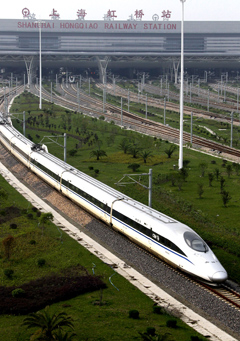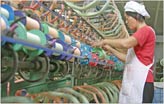Economy
Beijing to Shanghai speed to hit 350km/h
Updated: 2011-06-16 13:18
By Xin Dingding (China Daily)
BEIJING - The operating speed of the much-anticipated Beijing-Shanghai high-speed railway is likely to reach 350 km/h in the future, said a senior railway official.
Zhai Jianguo, chief accountant with the Beijing-Shanghai high-speed railway company, said on Wednesday that in 2007 the National Development and Reform Commission (NDRC), the country's economic planner, set 300 km/h as the operating speed for the line's first year of service.
|
 |
|
A CRH380B high-speed train departs Shanghai Hongqiao Railway Station on Monday. [Photo / Xinhua] |
The project's feasibility report, approved by NDRC in 2007, said that the high-speed railway's operating speed should be 350 km/h, but in the initial stage trains should run at 300 km/h and the railway should also operate 200 km/h trains.
Zhai explained that setting a one-year initial stage is a common practice, as the rail track must be tested over four seasons, including floods in summer and snowfalls in winter. At the end of that stage, the central government will check the line and decide whether to accept it.
"By then, we say a rail line starts formal operations," he said. "And we will reassess how many trains a day to run on the line as well as the speed for its formal operation, based on the one-year results and how well the public accepts the line.
"The possibility of running trains at 350 km/h on the line has not been excluded."
The initial stage's operating speed of 300 km/h, which is lower than expected, also has nothing to do with the quality of the project, Yang Qibing, deputy chief commander of the Beijing-Shanghai high-speed railway construction headquarters, said on Wednesday.
Yang also said the railway's construction time had not been shortened and that the milestone project had not sacrificed quality to meet a tighter construction schedule. Originally, the railway was due to open in 2012.
Yang explained that initial estimates said the line's construction would take five years, because the Dashengguan Bridge in Nanjing over the Yangtze River would take five years to build. But for the major part of the line, construction time was expected to take three and a half years.
The fact is, the construction of the Dashengguan Bridge had started at the beginning of 2006, two years before that of the major part of the Beijing-Shanghai high-speed railway, and the bridge was opened in January this year.
Work on other parts of the railway started at the beginning of 2008, a few months ahead of the ceremony on April 18, 2008, marking the start of construction of the Beijing-Shanghai high-speed railway, he said.
"The actual time of the railway construction has not been shortened," Yang said, rejecting claims that the project's construction time had been reduced to meet an advanced deadline and that this might have affected the quality of the work.
In fact, tests and checks have shown the landmark railway's quality is good.
For example, 55,585 concrete-strength tests on bridges, tunnels and culverts along the line have all passed checks conducted by the country's best laboratory in that field, he said, refuting earlier media reports that questioned the quality of concrete used in high-speed railways.
| ||||
Also, foundation piles for railway bridges that account for 80 percent of the railway's 1,318 kilometers have all passed checks conducted by a third party, Yang said.
The Beijing-Shanghai high-speed railway's infrastructure, including bridges and culverts, have a designed life span of 100 years, and this can be guaranteed, he added.
Specials

When two are one
After a separation of 360 years, Huang Gongwang's famous Dwelling in the Fuchun Mountains has been made whole again.

Wealth of difference
Rich coastal areas offer contrasting ways of dealing with country's development

Seal of approval
The dying tradition of seal engraving has now become a UNIVERSITY major



